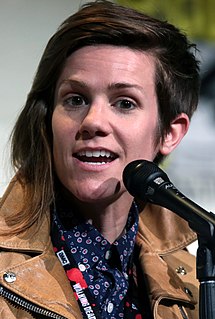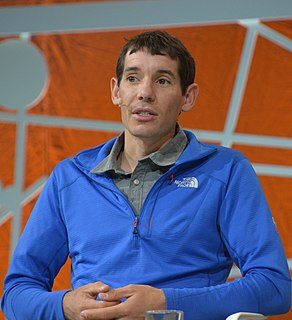A Quote by Edward Hoagland
Man is different from animals in that he speculates, a high-risk activity.
Related Quotes
Reversal is something that has been demonstrated in a number of different animals in a number of different ways. I think that's going to translate into larger animals and humans. We won't know until we try. But we are trying 65 different genes in different combinations to see if we can reproduce the aging reversal that we've seen in small animals.
Before I was a vegetarian, I traveled to South Africa and hung out there for a little bit. And they had different animals - did you know different parts of the world have different animals? Because I didn't until I got there! This is what being an American is like. You're like, "Every place has these animals."
There was an idea that God created man different from other animals, because man was rational and animals had drives and instincts. That idea of a rational man that was specially created went out the window when Darwin showed that we evolved from animal ancestors, that we have instincts, much as do animals, and that our instincts are very important. It was a much more sophisticated, nuanced, and rich view of the human mind.
If all other risk factors are normal, and you exercise moderately, your risk of having high CRP is one in 2000, .. A person who is a little overweight, with blood fats and cholesterol a little elevated, maybe with a little bit of high blood pressure -- we didn't used to think that having several of these little risk factors were a big deal. But it is. These little risk factors add up in a way that is worse for you than one big risk factor.
There are a few animals that have won themselves a bad reputation even though they have little or no effect on man. They have won their rating through man's interpretation of their attitude towards lower animals. These animals have been seen feeding in what appears to be a savage manner. But this behavior may perhaps be comparable to a man tearing the flesh off a chicken leg with his teeth.
With the socialization of the health care system through institutions such as Medicaid and Medicare and the regulation of the insurance industry (by restricting an insurer’s right of refusal: to exclude any individual risk as uninsurable, and discriminate freely, according to actuarial methods, between different group risks) a monstrous machinery of wealth and income redistribution at the expense of responsible individuals and low-risk groups in favor of irresponsible actors and high-risk groups has been put in motion.
Of all the differences between man and the lower animals, the moral sense or conscience is by far the most important. This sense, as Mackintosh remarks, "has a rightful supremacy over every other principle of human action"; it is summed up in that short but imperious word "ought," so full of high significance. It is the most noble of all the attributes of man, leading him without a moment's hesitation to risk his life for that of a fellow-creature; or after due deliberation, impelled simply by the deep feeling of right or duty, to sacrifice it in some great cause.



































